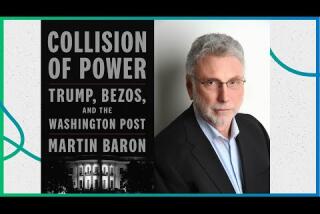Kinsley: Tom Friedman’s leadership crisis
“Traveling in Europe last week, it seemed as if every other conversation ended with some form of this question: Why does it feel like so few leaders are capable of inspiring their people to meet the challenges of our day?”
—Thomas L. Friedman, the New York Times, June 24
A Paris hotel:
“Bonjour. Concierge. May I help you?”
“Oui, merci. Je m’appelle Tom Friedman de la New York Times. J’ai une question.”
“Oui?”
“En Anglais?”
“But of course, monsieur. You would like some theater tickets, perhaps? Or restaurant reservations?”
“No, no. Look, you and I are having a conversation here, right?
“Oui, monsieur.”
“So why does it feel like so few leaders are capable of inspiring their people to meet the challenges of our day?
“Monsieur, cette conversation est terminée!”
---
A London psychiatrist’s office a short while later:
“Tell me more about this feeling you have, Mr. Friedman.”
“Well, doctor, it comes and goes. Probably half my conversations are perfectly normal. But the other half of the time, I could be talking about anything — the London Olympics, Rupert Murdoch’s troubles, the future of the euro — and I am suddenly overcome by a need to know why so few leaders are capable of inspiring their people to meet the challenges of our day. I’m going mad. What should I do?”
“Well, Mr. Friedman, feelings that few leaders are capable of inspiring their people to meet the challenges of our day are actually quite common among white male Americans in your age group. They are nothing to worry about.”
“But doctor, how can I rid myself of these terrible feelings?”
“I’m sorry, Mr. Friedman, but I see by the clock that we’re out of time.”
---
A romantic interlude (in Rome with Mrs. Friedman):
“But I do try to stay in touch with my feelings. I really do. I wrote a column about my feelings just the other day.”
“You call those feelings? You have a feeling about how few leaders are capable of inspiring people to meet the challenges of our day? That’s not a feeling. That’s a cliche. A feeling is ‘I love you. I want to take you in my arms and sweep you off your feet.’ Well I guess that’s a cliche too, but it’s a cliche with feeling. Don’t touch me, you unfeeling bastard.”
“But I said that exact thing to Angela Merkel just last week. She loved it.”
“What? That hussy? You’re still seeing her? Whispering sweet nothings, I suppose, about the need for more inspiring leadership. ‘Oh, Angela, lead me. More leadership. I feel a need for leadership. Inspire me to meet the challenges of our day.’ Is that it?”
“No, sweetheart, it’s not like that at all. But a man has needs. I, for example, have a need for leadership capable of inspiring people to meet the challenges of our day. I’m sorry. That’s just who I am.”
“This conversation is over.”
---
At a conference on the future of the euro, in Geneva, Fareed Zakaria, vice chancellor of the Institute for the Study of Thomas L. Friedman, summarizes recent research in the burgeoning field of Friedman studies:
“We looked at the question of whether Friedman’s impression is correct that every other conversation in Europe ends with a question (or rather — vital caveat — ‘some form of a question’) about why so few leaders can meet today’s challenges (or rather — vital caveat — can inspire ‘their people to meet’) today’s challenges. We concluded that though this is not true about all European conversations, it is true about all conversations with Tom Friedman.
“Our scientists have hypothesized that if Friedman is determined to direct the conversation toward a discussion about the need for inspiring leaders, the challenge of today’s challenges and so on, it creates a powerful magnetic force that is hard to resist. True, this fails to explain why, as Thomas L. Friedman himself observes, conversations tend to end when this question is brought up. But it’s a start.
“Future research will concentrate on the 50% of European conversations that apparently don’t end with any form of the question about leadership and challenges and inspiring the people and blah blah blah. Is this because these conversations touch on this subject, then veer away, or is it possible that one can travel through Europe for a week and not encounter anyone talking about the need for leadership at all?”
Michael Kinsley is a Washington writer and former editorial page editor of the Los Angeles Times.
More to Read
A cure for the common opinion
Get thought-provoking perspectives with our weekly newsletter.
You may occasionally receive promotional content from the Los Angeles Times.










